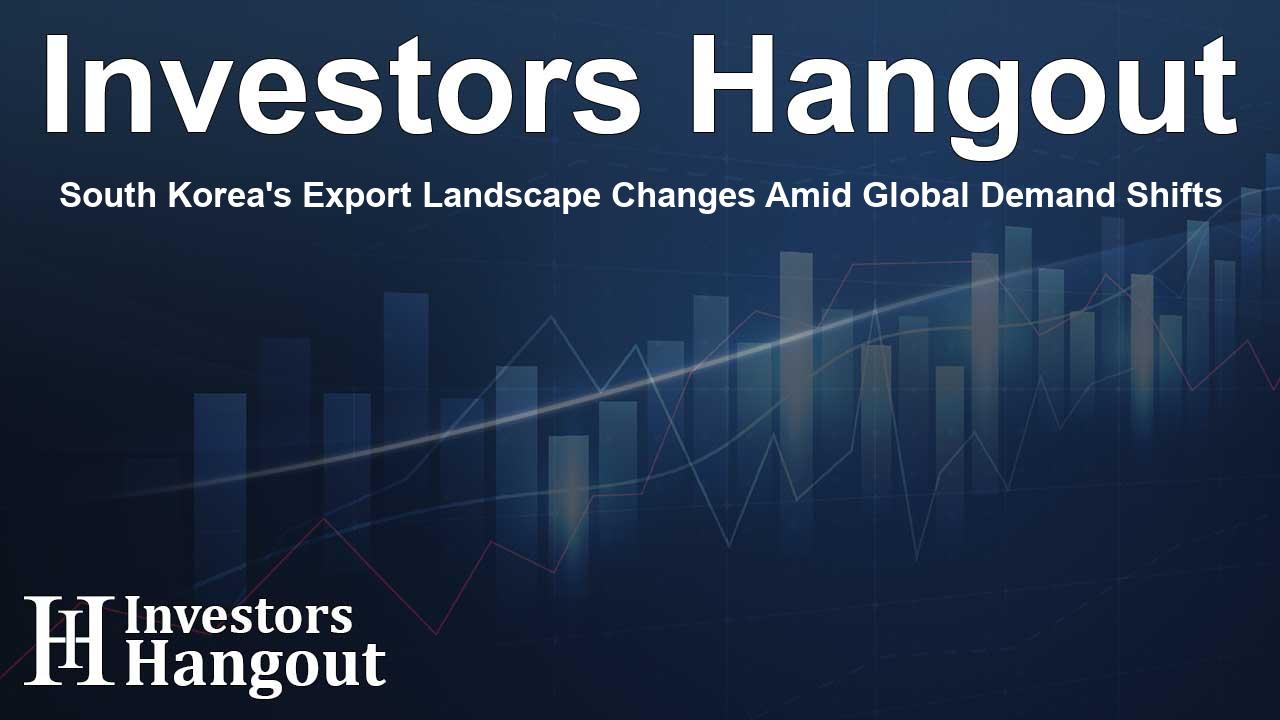South Korea's Export Landscape Changes Amid Global Demand Shifts

South Korea's Export Performance Analysis
Recently, South Korea experienced a noticeable slowdown in export growth, which has become a focal point in discussions about the country’s economic health. This shift has caught the attention of analysts and market participants alike.
Export Growth Rates: What the Numbers Reveal
In September, South Korea recorded a 7.5% increase in exports compared to the previous year. This marks a decrease from the 11.2% growth observed in August, highlighting the potential impacts of changing global demand on South Korean trade.
Comparison with Previous Year
The growth, although notable, fell short of analyst predictions of 6.5%, showcasing a unique trend in the country’s economic landscape. A significant contributing factor was the decrease in shipments to the United States, which rose only 1% in September, a stark contrast to the 11% increase noted in August.
Market Expectations and Monetary Policy
This deceleration in export growth has fueled speculation that the Bank of Korea may consider adjusting its monetary policy in the near future. Currently standing at 3.50%, the interest rates are at their highest since late 2008. With growth concerns starting to outweigh inflation worries, there are increasing calls for a potential rate cut in upcoming meetings.
Import Trends and Economic Indicators
The imports into South Korea showed a increase of only 2.2%, which was less than the 3.0% growth analysts had anticipated. This suggests that the internal demand may also be feeling the strain of global economic shifts.
Trade Surplus Highlights
Despite the slowing growth, the preliminary data revealed that the trade surplus widened to $6.66 billion, increased from $3.77 billion just a month earlier. This may indicate resilience in certain sectors even amidst overall slower growth.
Seasonal Factors Impacting Trade
One must also consider seasonality when analyzing these numbers. September featured fewer working days due to the extended break for the Chuseok holiday, an important factor that can skew trade statistics during this period.
Future Outlook for South Korean Exports
As we move forward, the outlook for South Korean exports remains uncertain. Analysts will be closely monitoring how external factors, including global demand fluctuations, will continue to impact trade dynamics. The next few months could be pivotal in shaping the country's economic roadmap.
Frequently Asked Questions
What caused the slowdown in South Korea's export growth?
The slowdown was mainly due to decreased shipments to major markets like the United States, reflecting shifting global demand trends.
How did imports change in September?
Imports only rose by 2.2%, which was below the forecasted increase of 3.0%, suggesting some slowing internal demand.
What is the current interest rate in South Korea?
The Bank of Korea's policy interest rate stands at 3.50%, the highest level since late 2008.
How does the Chuseok holiday affect trade statistics?
The Chuseok holiday led to fewer working days, which can significantly impact trade figures during September.
What is the trade surplus for South Korea in September?
The preliminary trade surplus widened to $6.66 billion, an increase from the previous month's $3.77 billion.
About Investors Hangout
Investors Hangout is a leading online stock forum for financial discussion and learning, offering a wide range of free tools and resources. It draws in traders of all levels, who exchange market knowledge, investigate trading tactics, and keep an eye on industry developments in real time. Featuring financial articles, stock message boards, quotes, charts, company profiles, and live news updates. Through cooperative learning and a wealth of informational resources, it helps users from novices creating their first portfolios to experts honing their techniques. Join Investors Hangout today: https://investorshangout.com/
Disclaimer: The content of this article is solely for general informational purposes only; it does not represent legal, financial, or investment advice. Investors Hangout does not offer financial advice; the author is not a licensed financial advisor. Consult a qualified advisor before making any financial or investment decisions based on this article. The author's interpretation of publicly available data shapes the opinions presented here; as a result, they should not be taken as advice to purchase, sell, or hold any securities mentioned or any other investments. The author does not guarantee the accuracy, completeness, or timeliness of any material, providing it "as is." Information and market conditions may change; past performance is not indicative of future outcomes. If any of the material offered here is inaccurate, please contact us for corrections.